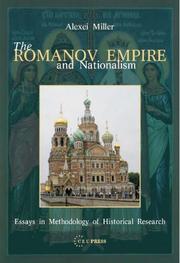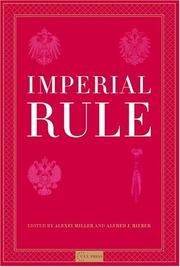| Listing 1 - 9 of 9 |
Sort by
|

ISBN: 9789639776197 963977619X 9781435633872 1435633873 9786155211454 6155211450 Year: 2008 Publisher: Budapest ; New York : Central European University Press,
Abstract | Keywords | Export | Availability | Bookmark
 Loading...
Loading...Choose an application
- Reference Manager
- EndNote
- RefWorks (Direct export to RefWorks)
Miller addresses the fabric of interaction between the imperial authority and local communities in the Romanov empire. How did the authorities structure the space of the empire? What were the economic relations between the borderlands and the center? How was the use of different languages regulated? How did the central authorities and local officials implement policies regarding different population groups? How did the experience, acquired in particular borderlands, influence the policies elsewhere —among others—through officials who often changed their place of service during their careers? How did the local elites and communities react to the policies of the imperial authorities? How did they uphold their special interests if the empire encroached on them, but also—how did they collaborate with the empire and how did they use imperial resources for local interests?
Nationalism --- Russia --- History --- Consciousness, National --- Identity, National --- National consciousness --- National identity --- International relations --- Patriotism --- Political science --- Autonomy and independence movements --- Internationalism --- Political messianism --- Soviet Union --- Historiography, History, Identity, Jews, Language policies, Nationalism, Russia, Russian Empire.

ISBN: 9786155211188 9786155211188 6155211183 1281377066 9786611377069 0585465401 9780585465401 6611377069 9639241601 9789639241602 Year: 2003 Publisher: Budapest ; New York : Central European University Press,
Abstract | Keywords | Export | Availability | Bookmark
 Loading...
Loading...Choose an application
- Reference Manager
- EndNote
- RefWorks (Direct export to RefWorks)
This pioneering work treats the Ukrainian question in Russian imperial policy and its importance for the intelligentsia of the empire. Miller sets the Russian Empire in the context of modernizing and occasionally nationalizing great power states and discusses the process of incorporating the Ukraine, better known as "Little Russia" in that time, into the Romanov Empire in the late 18th and 19th centuries. This territorial expansion evolved into a competition of mutually exclusive concepts of Russian and Ukrainian nation-building projects.
Nationalism --- History. --- Russia --- Ukraine --- Soviet Union --- An Úcráin --- I-Yukreyini --- IYukreyini --- Malorosii︠a︡ --- Małorosja --- Oekraïne --- Ookraan --- Oukraïne --- Oykrania --- Petite-Russie --- U.S.R.R. --- Ucrægna --- Úcráin --- Ucraina --- Ucrania --- Ucrayena --- ʻUkelena --- Ukraïna --- Ukrainæ --- Uḳraʼinah --- Ukrainian Council Socialist Republic --- Ukrainian S.S.R. --- Ukrainian Socialist Soviet Republic --- Ukrainian Soviet Socialist Republic --- Ukrainio --- Ukrainmudin Orn --- Ukraïnsʹka Radi︠a︡nsʹka Sot︠s︡ialistychna Respublika --- Ukrainska Radyanska Sotsialistychna Respublika --- Ukrainska Sotsialistychna Radianska Respublika --- Ukraïnsʹka Sot︠s︡ii︠a︡listychna Radi︠a︡nsʹka Respublika --- Ukrainskai︠a︡ Sovetskai︠a︡ Sot︠s︡ialisticheskai︠a︡ Respublika --- Ukrainskaya Sovetskaya Sotsialisticheskaya Respublika --- Ukrainujo --- Ukrajina --- Ūkrāniyā --- Ukranya --- Ukrayiina --- Ukrayina --- Ukrayna --- Ukuraina --- Ukyáña --- Wcráin --- Yn Ookraan --- Yr Wcráin --- Yukrain --- Ουκρανία --- Украинæ --- Украина --- Украинэ --- Украинмудин Орн --- Україна --- אוקראינע --- אוקראינה --- أوكرانيا --- ウクライナ --- 우크라이나 --- Ukraine (Hetmanate : 1648-1782) --- Russie --- Rossīi︠a︡ --- Rossīĭskai︠a︡ Imperīi︠a︡ --- Russia (Provisional government, 1917) --- Russia (Vremennoe pravitelʹstvo, 1917) --- Russland --- Ṛusastan --- Russia (Tymchasovyĭ uri︠a︡d, 1917) --- Russian Empire --- Rosja --- Russian S.F.S.R. --- Russia (Territory under White armies, 1918-1920) --- Politics and government --- Relations --- History --- E-books --- Identity, Language policies, Nation-building, Nationalism, Russia, Russian Empire, Ukraine.
Book
ISBN: 9789633860168 Year: 2014 Publisher: Budapest : Central European University Press,
Abstract | Keywords | Export | Availability | Bookmark
 Loading...
Loading...Choose an application
- Reference Manager
- EndNote
- RefWorks (Direct export to RefWorks)
940.28 --- 940.28 Geschiedenis van Europa: Congres Wenen - Wereldoorlog I--(1815-1914) --- Geschiedenis van Europa: Congres Wenen - Wereldoorlog I--(1815-1914) --- Imperialism --- Nation-building --- Nationalism --- Nation-state --- Military history, Modern --- Impérialisme --- Nationalisme --- Nation --- Histoire militaire --- History --- Histoire --- Europe --- Territorial expansion --- Foreign relations --- Politics and government --- Relations extérieures --- Politique et gouvernement
Book
ISBN: 9633860172 9789633860175 9789633860168 9633860164 9789633860160 Year: 2015 Publisher: Budapest : Central European University Press,
Abstract | Keywords | Export | Availability | Bookmark
 Loading...
Loading...Choose an application
- Reference Manager
- EndNote
- RefWorks (Direct export to RefWorks)
The essays in Nationalizing Empires challenge the dichotomy between empire and nation state that for decades has dominated historiography. The authors center their attention on nation-building in the imperial core and maintain that the nineteenth century, rather than the age of nation-states, was the age of empires and nationalism. They identify a number of instances where nation building projects in the imperial metropolis aimed at the preservation and extension of empires rather than at their dissolution or the transformation of entire empires into nation states. Such observations have until recently largely escaped theoretical reflection.
Military history, Modern --- Nation-state --- Nationalism --- Nation-building --- Imperialism --- National state --- State, The --- National interest --- Self-determination, National --- Consciousness, National --- Identity, National --- National consciousness --- National identity --- International relations --- Patriotism --- Political science --- Autonomy and independence movements --- Internationalism --- Political messianism --- Stabilization and reconstruction (International relations) --- State-building --- Political development --- History --- Europe --- Council of Europe countries --- Eastern Hemisphere --- Eurasia --- Politics and government --- Foreign relations --- Territorial expansion --- E-books --- Imperialism: history: 1800s --- Nationalism: history: 1800s --- Military history. --- Military historiography --- Military history --- Wars --- Historiography --- Naval history --- Europe: foreign relations: 1815-1871. --- Europe: foreign relations: 1871-1915. --- Europe: politics and government: 1800s. --- Foreign relations, History, Modernization, Nation-building, Nation-state, Nationalism, World War I.
Book
ISBN: 9786155225468 615522546X 9786155225154 615522515X 1283594072 9781283594073 9786613906526 Year: 2012 Publisher: Budapest ; New York : Central European University Press,
Abstract | Keywords | Export | Availability | Bookmark
 Loading...
Loading...Choose an application
- Reference Manager
- EndNote
- RefWorks (Direct export to RefWorks)
Thirteen essays by scholars from seven countries discuss the political use and abuse of history in the recent decades with particular focus on Central and Eastern Europe (Hungary, Poland, Estonia, Moldova, Ukraine, Russia as case studies), but also includes articles on Germany, Japan and Turkey, which provide a much needed comparative dimension. The main focus is on new conditions of political utilization of history in post-communist context, which is characterized by lack of censorship and political pluralism. The phenomenon of history politics became extremely visible in Central and Eastern Europe in the past decade, and remains central for political agenda in many countries of the regions. Each essay is a case study contributing to the knowledge about collective memory and political use of history, offering a new theoretical twist. The studies look at actors (from political parties to individual historians), institutions (museums, Institutes of National remembrance, special political commissions), methods, political rationale and motivations behind this phenomenon.
Historiography --- Historical criticism --- History --- Authorship --- Political aspects --- Criticism --- Postcommunism, Historiography, Political studies, Collective memory, Memory politics. --- Miller, A. I. (Aleksei I.) --- Lipman, Maria. --- Липман, Мария --- Lipman, Maria --- European 6 : --- World history.

ISBN: 9786155211140 9786155211140 9786155211140 6155211140 9786611376666 1281376663 1417575875 9781417575879 9781281376664 963924192X 9789639241923 9639241989 9789639241985 6611376666 Year: 2004 Publisher: Budapest ; New York : Central European University Press,
Abstract | Keywords | Export | Availability | Bookmark
 Loading...
Loading...Choose an application
- Reference Manager
- EndNote
- RefWorks (Direct export to RefWorks)
Renowned academics compare major features of imperial rule in the 19th century, reflecting a significant shift away from nationalism and toward empires in the studies of state building. The book responds to the current interest in multi-unit formations, such as the European Union and the expanded outreach of the United States. National historical narratives have systematically marginalized imperial dimensions, yet empires play an important role. This book examines the methods discerned in the creation of the Habsburg Monarchy, the Ottoman Empire, the Hohenzollern rule and Imperial Russia. It inspects the respective imperial elites in these empires, and it details the role of nations, religions and ideologies in the legitimacy of empire building, bringing the Spanish Empire into the analysis. The final part of the book focuses on modern empires, such as the German "Reich." The essays suggest that empires were more adaptive and resilient to change than is commonly thought.
Nationalism --- Imperialism --- Consciousness, National --- Identity, National --- National consciousness --- National identity --- International relations --- Patriotism --- Political science --- Autonomy and independence movements --- Internationalism --- Political messianism --- History --- Europe --- Turkey --- Russia --- Soviet Union --- Politics and government --- Empires, Habsburg Empire, Nation-state, Nationalism, Ottoman Empire, Russian Empire.
Book

Year: 2015 Publisher: Edmonton : Canadian Institute of Ukrainian Studies Press
Abstract | Keywords | Export | Availability | Bookmark
 Loading...
Loading...Choose an application
- Reference Manager
- EndNote
- RefWorks (Direct export to RefWorks)
This book is a collection of essays by prominent historians from Austria, Germany, Ukraine, Poland and Russia, who undertook a thorough and detailed study of one as yet inadequately researched aspect of the First World War--the occupation of Ukraine by the Central Powers in 1918. The book provides a new and fresh perspective on the historical context of Ukraine’s struggle for independence following the First World War.
Ukraine --- History --- Autonomy and independence movements.
Book

Year: 2015 Publisher: Edmonton : Canadian Institute of Ukrainian Studies Press
Abstract | Keywords | Export | Availability | Bookmark
 Loading...
Loading...Choose an application
- Reference Manager
- EndNote
- RefWorks (Direct export to RefWorks)
This book is a collection of essays by prominent historians from Austria, Germany, Ukraine, Poland and Russia, who undertook a thorough and detailed study of one as yet inadequately researched aspect of the First World War--the occupation of Ukraine by the Central Powers in 1918. The book provides a new and fresh perspective on the historical context of Ukraine’s struggle for independence following the First World War.
Ukraine --- History --- Autonomy and independence movements.
Book

Year: 2015 Publisher: Edmonton : Canadian Institute of Ukrainian Studies Press
Abstract | Keywords | Export | Availability | Bookmark
 Loading...
Loading...Choose an application
- Reference Manager
- EndNote
- RefWorks (Direct export to RefWorks)
This book is a collection of essays by prominent historians from Austria, Germany, Ukraine, Poland and Russia, who undertook a thorough and detailed study of one as yet inadequately researched aspect of the First World War--the occupation of Ukraine by the Central Powers in 1918. The book provides a new and fresh perspective on the historical context of Ukraine’s struggle for independence following the First World War.
Ukraine --- History --- Autonomy and independence movements.
| Listing 1 - 9 of 9 |
Sort by
|

 Search
Search Feedback
Feedback About UniCat
About UniCat  Help
Help News
News